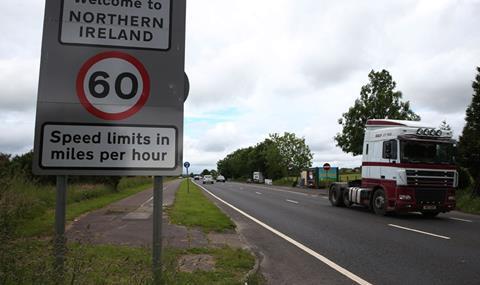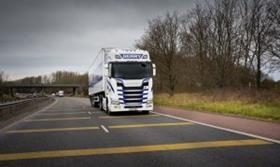
There is widespread agreement among UK and Irish parties that there should be no return to what has been labelled a ‘hard border’ separating Northern Ireland and Ireland after Brexit.
Trade on the island thrives on a seamless cross-border trade, but with the UK’s intention to exit not only the EU, but also membership of the single market and the customs union, the Irish border is recognised as an issue of special significance in wider Brexit negotiations.
Part of the Good Friday Agreement included a commitment to the removal of security installations at border crossings, and today the border is invisible and seamless across its 500km length.
There is also free movement on more than 250 roads crossing between Northern Ireland and Ireland. Although it is recognised that Ireland is a special case, if the Irish border were to be treated consistently with other third-country land frontiers, management of key road crossings would have to be established, typically including toll gantry-style monitoring.
The government’s paper on the subject published last month outlines the UK’s position on four key areas, including the avoidance of a hard border for the movement of goods.
However, Stephen Kelly, CEO of Manufacturing NI, said in response: “Terms such as ‘frictionless’ and ‘seamless’ and a ‘soft border’ can be misleading. It is important to recognise that in leaving the customs union it would be inevitable there would be a move away from enjoying free movement of goods across the border.”
Unworkable
Vincent Waddell, MD of Surefreight, is also sceptical of the UK’s ability to avoid a hard border. “A hard Brexit equals a hard border with the customs checks to go with it,” he said.
He believes that, ultimately, the EU will be making the decisions, and won’t be dictated to by the UK. Nevertheless, his stance is strong: “Anything short of a clear, no-stopping, seamless border would be unworkable.”

According to Irish Revenue commissioner Liam Irwin, EU law dictates that some inspections would be required after the UK leaves the EU, and that this could mean between 6% and 8% of freight being checked.
The hauliers that would feel the effects of delays more than most are those operating just-in-time or next-day services.
James Allen, MD of Allen Logistics (NI), has concerns in this respect. The haulier collects from production lines in Northern Ireland and transports the goods overnight for next-day delivery across Ireland.
He said: “In the old days of a hard border, there was only free travel between 9am and 5pm. There needs to be unrestricted travel 24/7 to make our business model viable.”
Regardless of the border solution implemented, there will undoubtedly be additional costs for hauliers.
Seamus Leheny, policy and membership manager at FTA in Northern Ireland, said: “If risk profiling needs to be done on goods moving from
Northern Ireland to Ireland, when the UK is outside of the customs union we could potentially have 500 to 600 lorries being stopped every day.
Those stops could amount to anything from five minutes to half an hour, depending on whether it is a paperwork check or a physical inspection.
“The running costs for a 44-tonne lorry that typically travels cross-border is £1 a minute, and those costs have to be covered by someone.”
He added: “With hauliers working to such tight margins, they could not possibly absorb the additional costs. The costs would have to transfer to those exporters, retailers and manufacturers who want to move goods outside of the UK.”
Allen Logistics operates a groupage service as part of the Irish TPN Pallet Network and frequently runs trailers containing between 40 and 60 consignments.
Currently no paperwork is needed, but Allen worries that each consignment might require its own paperwork for customs after Brexit.
Waddell added: “There is likely to be investment in IT systems required, as well as additional administration staff to load the data.”
Waddell fears that delays due to customs checks could result in more vehicles and drivers being required to do the same amount of work because drivers’ hours would be wasted waiting at checkpoints.
Manufacturing NI’s Kelly said any proposed soft border approach “threatens to damage the competitiveness of Northern Irish businesses by adding complexity to already complex supply chains”.
Patrick Derry, MD of Derry Refrigerated Transport, explained: “Factories we collect from don’t always run on time, and at the moment we can work with this, but if there are checks to contend with everything will have to run like clockwork to ensure timetables are met. When consolidating loads, it only takes one customer to be late to have a knock-on effect to the entire operation."
Relocation

Northern Irish operators are not ruling out the possibility of moving their operations across the border. Derry Refrigerated Transport is seeking to open a branch in Ireland as a response to B

rexit.
Derry said: “We have to make sure our business is safe and that our customers are safe so we don’t feel that we have any other choice.”
One of the solutions to the customs issue being proposed is to have a special status for Northern Ireland, whereby there would be a certificate of origin only valid for goods produced in Northern Ireland.
While the FTA is in favour of this concept, Leheny said: “A hard border would increase smuggling. Goods could be repackaged and classed as Northern Irish produce, which would undermine the credibility of local producers.”
There are similar concerns over a potential digital solution, whereby pre-registrations and surveillance cameras would be used to allow free trade and movement with the majority opinion being that it wouldn’t work.
Waddell said: “I can’t grasp that anything short of stopping at a border is going to be acceptable to the EU. What could cameras achieve? How would anyone know what was on the trailer?”
By Laura Reeve














